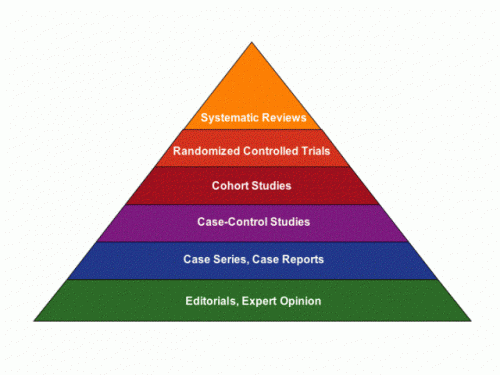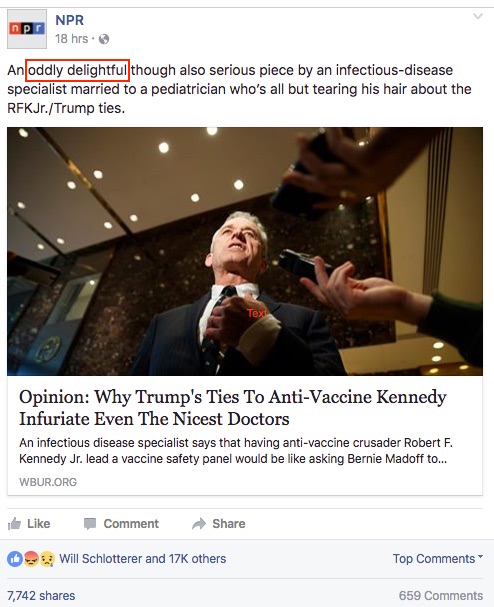An ongoing dialogue on HIV/AIDS, infectious diseases,
January 16th, 2017
Two Case Reports Worth Reading, and Enlisting Pro-Vaccine Support
 Case reports are pretty low down on the “levels of evidence” pyramid. This low status notwithstanding, when they are well done they can illustrate important clinical lessons, including these two:
Case reports are pretty low down on the “levels of evidence” pyramid. This low status notwithstanding, when they are well done they can illustrate important clinical lessons, including these two:
- A Las Vegas woman died after infection with a pan-resistant strain of Klebsiella. While CDC receives many isolates of carbapenem-resistant enterobacteriaceae (CRE), 80% are susceptible to at least one aminoglycoside and 90% to tigecycline — not this one, which retained susceptibility only to fosfomycin (a drug not available in this country for systemic use). One critical detail in this case was her multiple recent hospitalizations in India related to a right femur fracture and osteomyelitis of the right femur and hip. As with this case of metronidazole-resistant Bacteroides, the travel appears to be the critical exposure history. Question for those who practice in a Travel Clinic — do you now counsel patients about their risks of acquiring highly resistant organisms during travel to certain countries? Seems this risk is particularly high with travel to Southern Asia — probably higher than many of the more exotic conditions that get more attention.
- A man experienced a delayed diagnosis of TB meningitis due to a false-positive multiplex PCR. A 75-year-old man presented with mental status changes, and the BioFire FilmArray on the CSF was positive for HSV-1. Herpes encephalitis, case closed, right? However, the ultimate diagnosis was tuberculous meningitis, and the HSV-1 was not confirmed by additional PCR testing using another FDA-approved assay. Of course in hindsight, it seems clear that this wasn’t clinically consistent with HSV-1 encephalitis, FilmArray result notwithstanding — onset of confusion and speech difficulties was gradual, not acute; an MRI showed no parenchymal abnormalities, unusual in someone with HSV-1 encephalitis of this duration and severity; there was a neutrophilic pleocytosis and markedly elevated CSF protein; he developed hydrocephalus. Individually, several of these could rarely be seen with HSV-1 encephalitis, but together along with his clinical worsening they appropriately raised the concern that the diagnosis was incorrect. Of course hindsight is 20-20, and the most important message in this case is not to succumb to “premature closure” if the clinical picture does not fit the lab test result — an especially important lesson with new testing modalities.
Now, to enlist your support for vaccines, for which there is the highest level of evidence for efficacy and safety. At the kind invitation of Carey Goldberg, the skillful editor of WBUR’s CommonHealth blog, I wrote a piece about the possible appointment of Robert F. Kennedy Jr. by Trump to lead a commission on vaccine safety and scientific integrity.
Kennedy, you may be aware, has a lengthy history of pushing anti-vaccine propaganda.
To you, loyal readers of an ID/HIV blog, I am going to state with 99.9% confidence that you will agree with my views — but please read the piece anyway. This debate about the risks and benefits of childhood immunizations is still (amazingly), a thing — just read the comments if you can stand it — and we need all the support we can get.
But I have a query. Here’s the NPR Facebook page on the piece, with one section highlighted for discussion:
Not sure exactly what they meant by “oddly delightful”, but I’m pretty sure it’s better than the converse — “delightfully odd.”
Happy MLK Day.
[youtube https://www.youtube.com/watch?v=cuAl5cMTJ7A&w=560&h=315]



Thank you, thank you, Paul. I an ID doc who grew up at a time when all my friends and I got measles, mumps, varicella, and rubella and when the fear of being in an “iron lung” dictated summertime behavior to avoid polio exposure. I am so saddened to think that 70 years later legitimacy is somehow assigned to the misguided views of those who would turn back the clock and place our grandchildren at risk. As the vitriolic responses to your ever so gentle and reasonable piece demonstrate, there are those who apparently cannot be convinced about vaccines’ efficacy and safety. We can only hope that thoughtful individuals will continue to examine the evidence and embrace immunization as one of humankind’s greatest achievements.
Dr Sax
I read your vaccine article dated January 13th on face book. I thought you were spot on. I am an OB/gyn in Wichita, KS and was thinking about many other benefits of the HPV vaccine: fewer Pap smears, fewer abnormal Pap smears resulting in colposcopy, fewer young women with genital warts in my office thinking their life is ruined thus causing less anxiety in life and sexual activity. Just thought I’d try to add a bit of fuel to your fire. Keep it up. Thanks!!
Kurt Kauffman, MD, FACOG
Thanks for that essay, Paul. I am going to have my sophomore nursing students read it — and the comments, so they understand the kinds of anti-vaccine arguments they will hear as healthcare professionals.
When I read that Kennedy was going to be appointed by Trump to some sort of vaccine safety committee, I immediately emailed my family members the link to the story with the email subject line: “Next up: The Committee to Prove the Earth is Flat”. That is precisely how backwards this move appears to me.
As you know, I loved your piece, and I find “oddly delightful” to be an oddly delightful compliment. They probably found it odd because they’re not used to wit and humor in writing by physicians.
Dr Sax,
I read and enjoyed your article, but one thing not to forget is that it isn’t just the association with RFK Jr that is scary about Trump’s vaccine stance. He had already shown his willingness to pander to the conspiracy theory/anti-vaccine crowd, which of course straddles both sides of the political spectrum. Unfortunately this is the crowd for which education and reason, as demonstrated in your article, have no merit.
While I enjoyed your article and agree, I do not completely agree. All vaccines are not created equal. The annual influenza vaccine is a flawed vaccine with no evidence supporting it other than flu vaccine manufacturer’s studies. The one and only double blind study done in Hong Kong showed no real benefit and actually an increase in URI’s and influenza like illness in those vaccinated. In addition, Australia’s study showed that during the H1N1 outbreak the infection and mortality rates were far higher in the TIV group verse non vaccinated. In closing, hospitals need to abandon the flawed policy of mandating a vaccine that has poor efficacy rates and relies on vaccine manufacturers provided data. I have not even mentioned the zero liability aspect provided by the vaccine court.
Good point about the flu vaccine, which is very flawed. Lots of room for improvement.
Most of the controversy about immunization policies, however, is focused on childhood vaccines, for which the efficacy, safety, public health, and cost data are far stronger.
Paul
With respect, your original piece argued that those who avoided the flu vaccine (say, for the regular negative reactions they get) were “selfish” because what about those poor frail old people who will die because you didn’t? Just this week there was an article on MedpageToday, IIRC, about publications showing that the results of the studies purporting to show huge reductions in death rates for nursing home patients when staff were vaccinated – the best-case scenario for lifesaving indirect vaccination – were mathematically impossible, could not possibly be true. Less biased studies show little or no benefit. Thus there is no need to confront the philosophical question of whether it is beneficent to shield a person who will be confined in a nursing home bed until death from potential causes of a quick death.
By the way, you also asked about chickenpox being “mild compared to what?” Well, mild compared to the diseases that were the first target of vaccination, for one thing – discomfort is not a life-threatening crisis – but also, mild compared to chickenpox suffered by adults. It is a serious problem that the chickenpox vaccine wears off at just about the age when chickenpox actually starts to carry a significant risk of major complications, especially since economic, ecological and political trends all suggest that the percentage of working-class adults who can’t afford prophylactic medical care is likely to go up, rather than down, in future. If sparing your kid a week of discomfort now puts him at risk of a lasting complication twenty years down the road, it’s hardly self-evident that the benefits of vaccination outweigh the costs.
Jane,
I think your comments about the flu vaccine’s deficits have some merit, and indeed have written critically about it numerous times before, including here. I still think we healthcare workers should be vaccinated, since it’s the best we’ve got for now.
As for chickenpox, there is no evidence that we are seeing an epidemic or uptick in severe adult cases since the introduction of the vaccine. In fact, the numbers of such cases have gone down.
Paul
Vaccines are so important! My nephew is austitic, and my brother, who is a well-educated professor of Computer Engineering, was actually considering not immunizing his daughter. I sent him every bit of medical literature I could find that refuted that ridiculous MMR “study.” I’m happy to report thst both of his children are fully immunized.
Paul,
There wasn’t anything odd about your delightfully witty, remarkably coherent and comprehensive argument in support of vaccines! I am a Family physician of 30 some years and early in my career working for Indian Health Service witnessed the transformational power of both pneumococcal and haemophilus influenza vaccines. Also, I have the unique perspective of having inherited familial hypogammaglobulinemia, as you know vaccines are ineffective for me and I am dependent on antibodies derived from others and concentrated in IVIG (which fortunately is extremely effective). You might wonder why I chose this profession which exposes me to contagious diseases, and at times so have I – wouldn’t trade it for anything. Keep up your outstanding work which is anything but odd!
Interesting views regarding the XDR-Klebsiella and possible treatment with IV fosfomycin and ways to obtain it:
http://allphasepharma.com/dir/2017/01/19/3071/cdc-report-pan-resistant-ndm-klebsiella-nevada-sad-tale/
The FilmArray paper is an excellent cautionary tale with some great take-home messages. As multiplex panels become more widespread, we face two issues which are not exactly new.
Beyond false positives, molecular tests, even more than their predecessors, are sometimes sensitive enough to detect true but irrelevant positives (colonization). Examples of this phenomenon abound in the medical literature and clinical practice (the most common being asymptomatic bacteriuria). When we apply old diagnostic and therapeutic strategies to new tests with different performance, we often run into trouble. See Adam Cifu’s brilliant 2012 review of PE for an illustration, at https://www.ncbi.nlm.nih.gov/pubmed/22473672
What’s not new at all is the problem of “shotgun” testing. We all (should) know from Bayesian logic that when you order tests for very unlikely diagnoses, the positive predictive value will generally be low. (For example, almost all of our positive Brucella IgMs in a nonendemic area are false positives.) That is one of several reasons not to look for everything in everybody. However, the megaplex PCR panels coming into use pretty much do exactly that. The case in OFID illustrates nicely how trying to miss nothing can cause you to miss everything.
The concept of the “incidentaloma” is very familiar to radiologists. Perhaps we need a new term, like “incidentalemia” or “incidentalgenia” to describe true but irrelevant molecular findings.